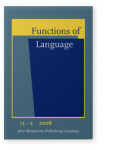Vol. 13:2 (2006) ► pp.151–196
Speaking, telling and assertion
Interrogatives and mood in English
This paper distinguishes between speaking, telling and assertion. Speaking is approached in ‘mechanical’ terms, as the production of linguistic forms. Telling is defined in terms of the degree of the speaker’s commitment to what s/he says, and, therefore, as operative both with respect to constructions of knowledge and of decision. That is, telling is said to apply to constructions both in the indicative and imperative moods, to those with ‘wish’ as well as those with ‘thought’ subjunctives, and to both those with epistemic, and those with deontic, modal verbs. Assertion is defined as full telling of full knowledge. This definition leads to the establishment of three broad categories of non-assertive constructions, which are nevertheless ‘told’.
Four telling operators are proposed, defined in terms of degrees of commitment. The discussion builds on an earlier analysis of knowledge constructions in terms of propositional attitudes, by applying telling operators to four of the categories established there. From this it emerges that an account of knowledge constructions in terms of epistemic operators alone cannot be adequate, since telling operators sometimes act to modify epistemic modalities.
Other than full telling is seen as introducing a further kind of modality. This telling modality is realized in the knowledge component by the interrogative sentence type in sentences containing either a finite lexical verb or an epistemic auxiliary, and by subjunctive mood in the former and ‘past tense’ forms of the latter.
Cited by (4)
Cited by 4 other publications
This list is based on CrossRef data as of 2 july 2024. Please note that it may not be complete. Sources presented here have been supplied by the respective publishers. Any errors therein should be reported to them.
